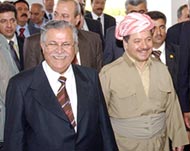Cracks in Iraq Shia-Kurd coalition
Sharp divisions have emerged between Iraq’s ruling Kurdish and Shia Muslim factions after Iraq’s Kurdish president accused the Shia prime minister of breaking coalition promises and overly dominating the government.

Kurdish officials warned on Saturday they would consider pulling out of the government if their demands are not met. That would cause the collapse of the government and put a new layer of political instability and fragmentation between Iraq‘s main communities.
The friction comes ahead of a 15 October vote on a new constitution, which both the Kurds and Shia support. But Iraq‘s Sunni minority is trying to defeat the charter at the polls, fearing it will give too much power to the other two communities.
Kurdish leaders have complained to Shia Prime Minister Ibrahim al-Jaafari that the coalition’s Shia parties, known as the United Alliance, have not upheld promises to start work on resettling Kurds in the northern city of Kirkuk or to fairly distribute government positions between the coalition parties.
Earlier this month, the heads of the Kurdish Alliance – President Jalal Talabani and Massoud Barzani, president of the northern Kurdish region – sent a letter to al-Jaafari outlining the Kurds’ complaints but received no reply.
Accusations
Talabani on Saturday lashed out at the prime minister.
|
“It is not right that the Ministry puts itself before the government. There is an important agreement which is being ignored” Jalal Talabani, |
“One of the problems with the prime minister is that he is violating the laws,” Talabani told reporters. He said al-Jaafari’s office was acting unilaterally without working with its Kurdish allies.
“The ministry is not the government – the ministry is the ministry,” he said, referring to al-Jaafari’s office. “It is not right that the ministry puts itself before the government. There is an important agreement which is being ignored,” he said of deals over Kirkuk in the coalition that formed the government.
“The agreement says that after one month from forming the government, the government should begin to address the issue of Kirkuk using the government committees set-up to solve this issue. Five months have now passed and despite our repeated calls, they haven’t taken a single step.”
The Kurds are pushing for the return of Kurds forced out of the oil-rich Kirkuk area during the rule of Saddam Hussein. The Kurds’ return is sharply opposed by Sunnis, who fear Kurds want to join Kirkuk to the autonomous Kurdistan region in the north.
Angry reaction
Talabani’s comments brought angry reaction from Shia legislators during a parliament session on Saturday. Lawmaker Mahmoud al-Radhi criticised Talabani for going public with the differences just before the 15 October referendum.
“The country is passing through a very dangerous phase, so what has happened is not reasonable,” he said.
 |
|
Kurdish leaders say the Shia |
The government was formed on 28 August after months of wrangling following January elections in which members of Iraq‘s Shia Muslims won a majority of seats in parliament.
But they needed Kurdish support to form the cabinet. Asked if the Kurds would pull out of the government or call a no-confidence vote, Kurdish lawmaker Mahmoud Othman said “if these issues are not addressed” the Kurdish leadership would meet and decide.
In the letter sent to al-Jaafari this month, Talabani and Barzani made a veiled threat to pull out of the government.
Scenarios
“We hope that we will not have to take further steps, particularly what is allowed in Article 6 of the coalition agreement,” they wrote, referring to an article allowing either party to withdraw.
The collapse of the government would cause more political turmoil at a time of already great uncertainly.
If the constitution passes, national elections are to be held in December to create a new parliament to choose a government.
If the constitution fails, the elections will pick a new transitional parliament tasked with drafting a new document.